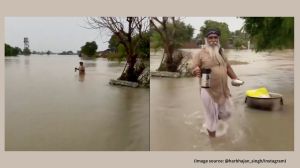Stay updated with the latest - Click here to follow us on Instagram
Delhi to get 20 more air quality monitoring stations by October
The new stations will monitor eight parameters --ultrafine particulates PM 2.5, PM 10 and sulfur dioxide, nitrogen dioxide, carbon monoxide, benzene, ammonia and ozone
 Apart from DPCC, Central Pollution Control Board (CPCB) runs 10 monitoring stations, although there are overlaps in terms of locations. (File Photo)
Apart from DPCC, Central Pollution Control Board (CPCB) runs 10 monitoring stations, although there are overlaps in terms of locations. (File Photo)
Monitoring of air quality in the national capital will expand by this October with the Delhi government informing that work related to the setting up of 20 new monitoring stations is in “advanced stage”.
The Environment Department today announced that it will complete the tendering process by April and open the stations by October.
Currently, the Delhi Pollution Control Committee (DPCC) operates six monitoring stations.
The new stations will monitor eight parameters –ultrafine particulates PM 2.5, PM 10 and SO2 (sulfur dioxide), NO2 (nitrogen dioxide), CO (carbon monoxide), benzene, ammonia and ozone, similar to the existing monitoring stations.
“The network is so designed that it will cover the existing gaps in measuring ambient air quality and will give representative status of pollution levels in Delhi,” the government stated.
These stations will be installed in different land use areas such as residential, industrial, commercial, institutional et al in order to give true representative character of air pollution in the city, it said.
Particulate Matter (PM) 2.5 and PM 10 are microscopic particles, multiple times smaller than the average width of a human hair. They can damage the respiratory system and also enter the bloodstream causing further complications.
Apart from DPCC, Central Pollution Control Board (CPCB) runs 10 monitoring stations, although there are overlaps in terms of locations. SAFAR, that falls under the Ministry of Earth Sciences, operates another eight stations in the city.







